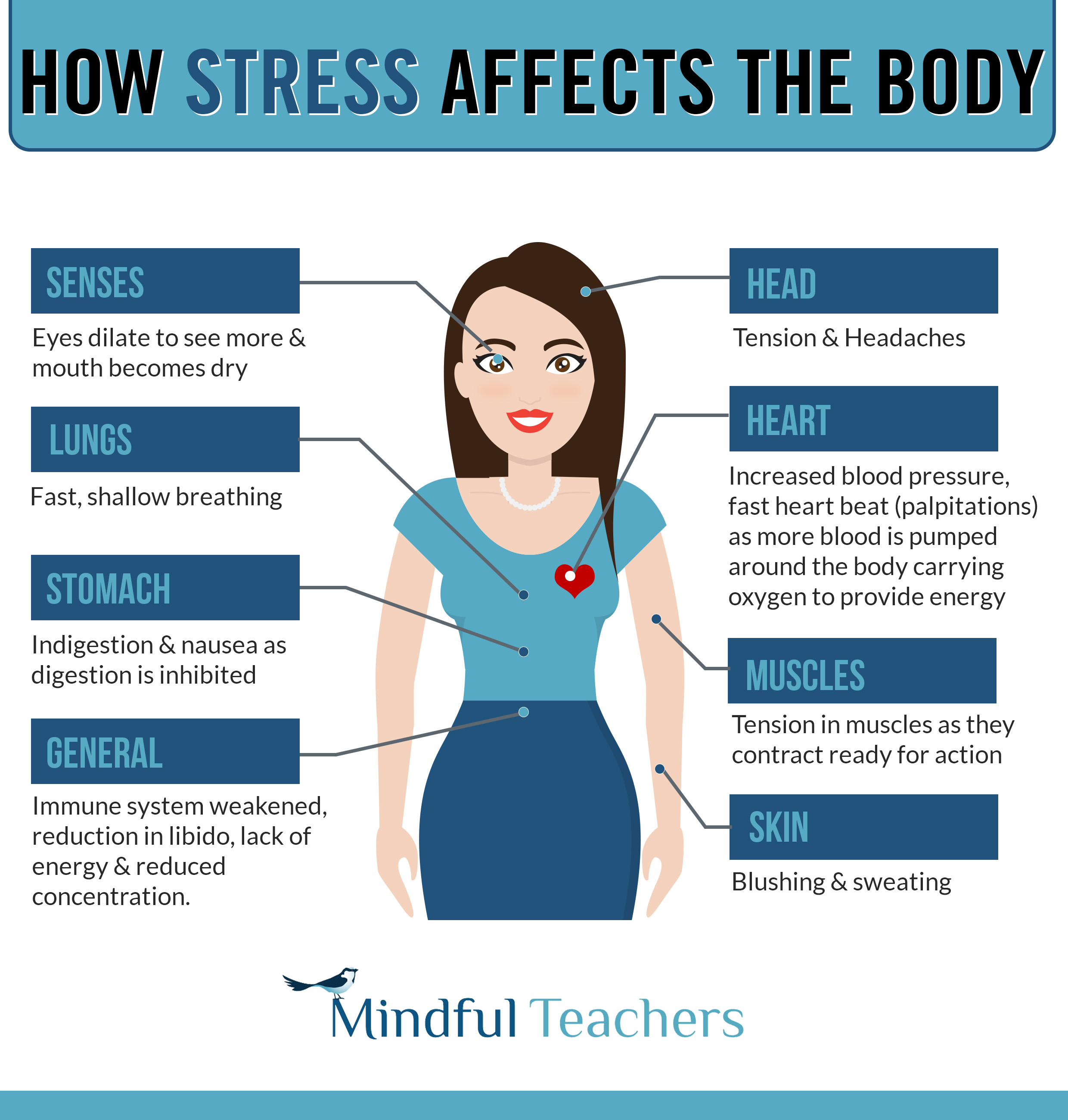
How Does Stress Affect The Brain Medical News Today

How It Affects Us The Stress Management Society
Stress has also an effect on the function of the cardiovascular system, such as increased heart rate, narrowing of the veins and increased risk of thrombosis and ischemia. how to stress effect the study adds that stress affects the gastrointestinal health by affecting appetite, normal function of gi tract, stomach acid secretion, and gi inflammation. The way stress affects the body can range from a quick chest flutter to serious issues like depression and an increased risk for heart attack and stroke. find out how stress affects you, and how. Stress is normal. everyone feels stress related to work, family, decisions, your future, and more. stress is both physical and mental. it is caused by major life events such as illness, the death of a loved one, a change in responsibilities or expectations at work, and job promotions, loss, or changes.Stress effects on the body: gastrointestinal.While short-term stress may cause men to produce more of the male hormone testosterone, this effect doesn’t last. if stress continues for a long time, a man’s testosterone levels can begin to. An obstetrics and gynecology information site on the mind-body connection, effects of stress on women''s health, and how to prepare for surgery mentally, physically and spiritually. Stress affects us all. you may notice symptoms of stress when disciplining your kids, during busy times at work, when managing your finances, or when coping with a challenging relationship. stress. Stress can also affect the way food moves through your body, leading to diarrhea or constipation. you might also experience nausea vomiting, or a stomachache. muscular system.
Indeed, stress symptoms can affect your body, your thoughts and feelings, and your behavior. being how to stress effect able to recognize common stress symptoms can help you manage them. stress that's left unchecked can contribute to many health problems, such as high blood pressure, heart disease, obesity and diabetes. Stress hormones affect your respiratory and cardiovascular systems. during the stress response, you breathe faster in an effort to quickly distribute oxygen-rich blood to your body. if you already have a breathing problem like asthma or emphysema, stress can make it even harder to breathe. The effects of stress on your body medically reviewed by timothy j. legg, phd, psyd, crnp, acrn, cph constant stress can increase your risk for long-term health issues like heart attack and diabetes.
Stress Effects On The Body Gastrointestinal
How does stress impact our mental health?.

Stress can affect every aspect of our mental and physical health. a new study now shows just how exposure to stress can impact memory and brain volume. Stress can affect this brain-gut communication, and may trigger pain, bloating and other gut discomfort to be felt more easily. the gut is also inhabited by millions of bacteria that can influence its health and the brain’s health which can impact the ability to think and affect emotions. Stress targets the weakest part of our physiology or character; if you are prone to headaches or eczema, this will flare up. if you have low levels of patience or tolerance for others, this will be the first area to present under times of stress. Stress can also lead to emotional problems, depression, panic attacks, or other forms of anxiety and worry. it's not just the stress itself that's the problem. it's how you respond to it.
Chronic stressaffects the whole body. it can have several physical or psychological symptoms, which can make functioning on a daily basis more challenging. the type and severity of symptoms vary. Stress is something everyone experiences. despite being unpleasant, stress in itself is not an illness. but there are connections between stress and mental health conditions including depression, anxiety, psychosis and post-traumatic stress disorder (ptsd).. research into stress its causes, effects on the body and its links to mental health is vital. Stress can also make pain, bloating or discomfort felt more easily in the bowels. it can affect how quickly food moves through the body which can cause either diarrhea or constipation. furthermore, stress can induce muscle spasms in the bowel which can be painful. stress can affect digestion, and what nutrients the intestines absorb.

Your reaction to stress may affect your blood pressure your body produces a surge of hormones when you're in a stressful situation. these hormones temporarily increase your blood pressure by causing your heart to beat faster and your blood vessels to narrow. Stress can affect the type of memories we form as well. if we are stressed during an event, we may have more difficulty accurately remembering the details of the event later, as the stress we felt colors our perceptions as well as our ability to recall what we perceived at the time. Acute stress: acute stress is a very short-term type of stress that can either be positive or more distressing; this is the type of stress we most often encounter in day-to-day life. ; chronic stress: chronic stress is stress that seems never-ending and inescapable, like the stress of a bad marriage or an extremely taxing job; chronic stress can also stem from traumatic experiences and.

Comments
Post a Comment